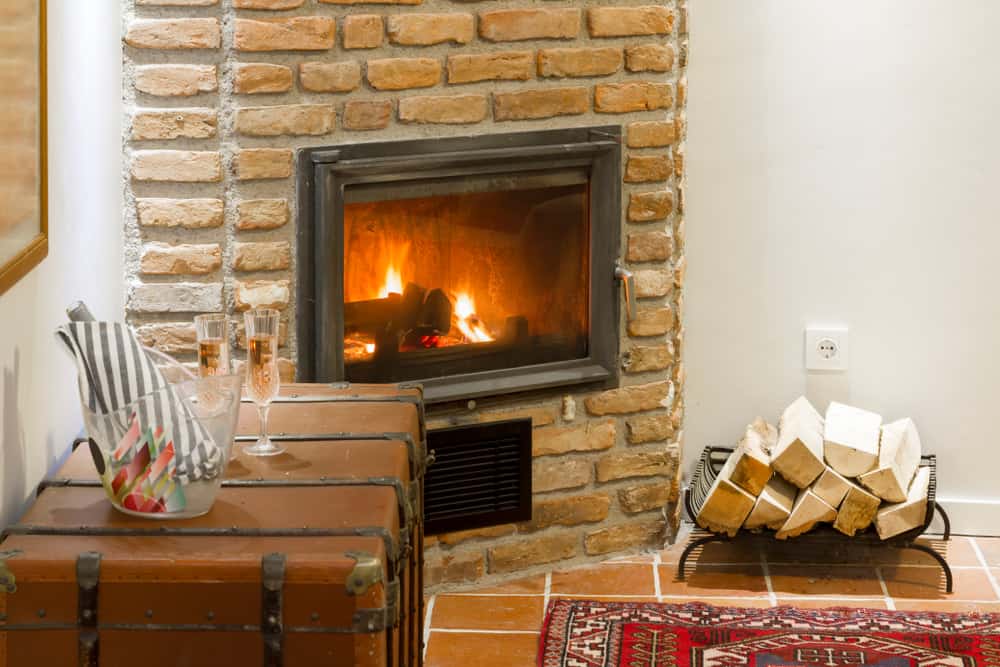When you’re searching for your dream home, finding one with an original fireplace can be the deciding factor. Nothing adds more character and charm to a home than an original masonry fireplace to decorate during the holiday season and to gather around during cold winter nights.
While that fireplace can add both monetary and emotional value to your home, it’s important you understand how to take care of it before using it. A fireplace, whether used regularly for warm fires or just used as a decorative piece, is a complex system that can’t be neglected. Below are what we think are three of the most important factors every homeowner should know and should do when they buy a home with a fireplace.
Have Your Fireplace Inspected
 This may seem like a very basic step, but because it’s so simple too many people fail to realize just how important a professional fireplace and chimney inspection is – especially when you buy a home for the first time. Ideally, you should have the fireplace and chimney inspected before making the purchase. A masonry fireplace can add a lot of value to a home, but any issues with it can be expensive and complicated to fix. The last thing you want to do is buy an expensive home thinking the fireplace and chimney are well-maintained only to realize you will need to pay for expensive repairs.
This may seem like a very basic step, but because it’s so simple too many people fail to realize just how important a professional fireplace and chimney inspection is – especially when you buy a home for the first time. Ideally, you should have the fireplace and chimney inspected before making the purchase. A masonry fireplace can add a lot of value to a home, but any issues with it can be expensive and complicated to fix. The last thing you want to do is buy an expensive home thinking the fireplace and chimney are well-maintained only to realize you will need to pay for expensive repairs.
A neglected fireplace and chimney can have structural damages that need to be repaired regardless of whether you ever want to use it since structural damage puts your whole home in danger. A fireplace and chimney that is cracked, without any fireplace doors or a chimney cap can also make it easy for cold air or water to get into your home. Even small animals can find their way into your home. Finally, a dirty or damaged chimney is dangerous to use, since the airflow could be blocked or it could contain flammable substances. For this reason, a fireplace and chimney inspection should be the first thing you require from someone selling your home with a fireplace or any chimney system. That way they can pay for those repairs, or you can agree on the right price accordingly.
Have Your Fireplace and Chimney Cleaned
After buying a home with a fireplace, don’t use it right away unless you know the chimney has been cleaned recently. A dirty chimney will make it difficult for smoke and gas to go through it and leave your home. This can result in smokier fires and the presence of gasses like carbon monoxide. A dirty fireplace can also contain flammable substances like creosote, which can cause chimney fires. Since a chimney gets dirty with use, it has been recommended that homeowners have their chimneys cleaned professionally at least once a year. Using a dirty chimney is dangerous, so only build a fire after you know for a fact it has been cleaned within the last year at least, and remember to schedule annual cleans with your local chimney sweep.
Build Fires Correctly
Building a fire for your family to enjoy is not as simple as merely finding some wood, throwing it in your fireplace, and lighting it. How you build fires and what materials you use are the most important part of keeping your fireplace and chimney in good condition. Using the wrong materials and taking shortcuts can result in fires that are less enjoyable, dangerous and that will damage your fireplace and chimney.
First, always burn seasoned wood. Seasoned wood is wood that has been dried for at least six months. Using wet wood will create smokier fires and will cause a buildup of moisture into your chimney. Moisture is one of your chimney’s biggest enemies and will accelerate the buildup of creosote.
Secondly, never burn random materials you aren’t completely sure are safe. When you’ve built a fire, it may be tempting to throw trash or construction scraps in it, but these materials may release harmful substances when burned. Only burn wood meant specifically for fireplaces, or materials you know are safe, like unpainted paper.
Finally, never overload your fireplace. Bigger is not always better, especially when it comes to fires in your home. Building fires that are too big can damage your chimney and can also get out of control quickly. To keep your fires controlled, make sure you don’t get carried away with too much wood and never use lighter fluids to start your fires.
If you know nothing else about fireplaces or chimneys, taking these steps and following these basic rules will help ensure you’re never endangering your home or family with a damaged fireplace or chimney. For more information on how to use your fireplace correctly, or to schedule an inspection or cleaning, fill out the form below.
